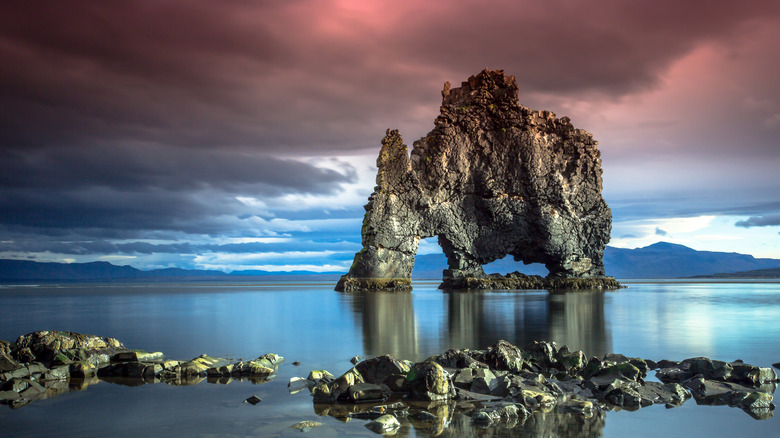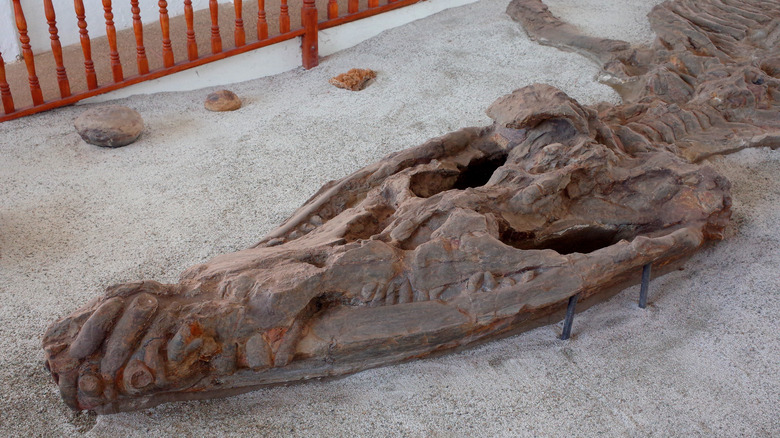Here's What Would Happen To Earth If The Extinct Kronosaurus Lived Today
The ocean is a perilous place. With 3,000 to 9,000 pounds of pressure per square inch, it can literally crush you to death (via Ocean Planet). But if the fortunately extinct dinosaur known as Kronosaurus were alive today, the ocean wouldn't have to go through all that trouble. Good old ocean-dwelling "Kronos" would take care of that. After all, he had quite the reputation for playing with his food. Much like a cat in the presence of a helpless mouse, Kronosaurus is believed to have play-fought his prey to death in a process that involved a lot of shaking, shoving, and eventually head crushing (via Forbes).
The only real difference is that his prey was in the open water, where a whole lot more crushing could happen. Kronosaurus is basically the ocean's answer to Tyrannosaurus rex. Picture a colossal lizard with a head the size of two grown men standing on top of one another and you have this Jurassic wonder.
Envision, if you will, a world where the Kronosaurus doesn't die a fiery, comet-ridden death. Rather, he lives out his days in modern times as a massive marine reptile five times as heavy as the notorious great white shark — and probably just as hungry (via Britannica).
If Kronosaurus was alive, the ocean tourism industry would definitely be dead
If you think movies like "Jaws" cleared the beaches, imagine how much of a hit ocean tourism would take in a world where Kronosaurus lives. ThoughtCo. reports that this massive deep-sea dweller takes its name from a child-eating figure from Greek mythology. Hailing from the Jurassic Period, we know our friend Kronos wasn't really a child-eater. Oh no — eating children is an activity better left to sharks. Kronosaurus, on the other hand, his head measuring 12 feet long, was the monster that ate those sharks for breakfast (via Britannica).
With a 33-foot mammoth reptile wreaking havoc on seas the world over, it's highly likely that sports like boating, surfing, and recreational scuba diving would not be a thing. This one seemingly small change would actually cripple the global economy, robbing it of approximately $143 billion annually (via the National Oceanic and Atmospheric Administration). To put things into perspective, that's enough money to put almost 1 million students through a four-year college program for free, or to distribute medicine, food, and security packages to 100 countries across the globe (via The What If Show). Certainly nothing to scoff at.
In a world where Kronosaurus lives, humans would be at risk of dying out
The ocean doesn't only serve recreational purposes — underwater exploration and excavation make all sorts of modern amenities possible. For example, ocean transit accounts for approximately 76% of national trade (via the National Oceanic and Atmospheric Administration). The ocean is also a sustainable — albeit almost untapped — global food source we are expected to rely on more as we embark on an uncertain environmental future. Notwithstanding, more than 100 necessary pharmaceutical products originate in the sea (via Smithsonian Magazine).
From this perspective, it's clear that humans would likely die out in a world where the notorious shark-eater Kronosaurus lives. Getting in the water would mean a swift, shaken, head-bashing end. Staying out of the ocean would mean a slow, painful death by way of starvation, poverty, and disease. Any humans fortunate enough to survive would bear the brunt of an altered landscape where cities are crushed under a different kind of pressure — the pressure of a dying economy.


